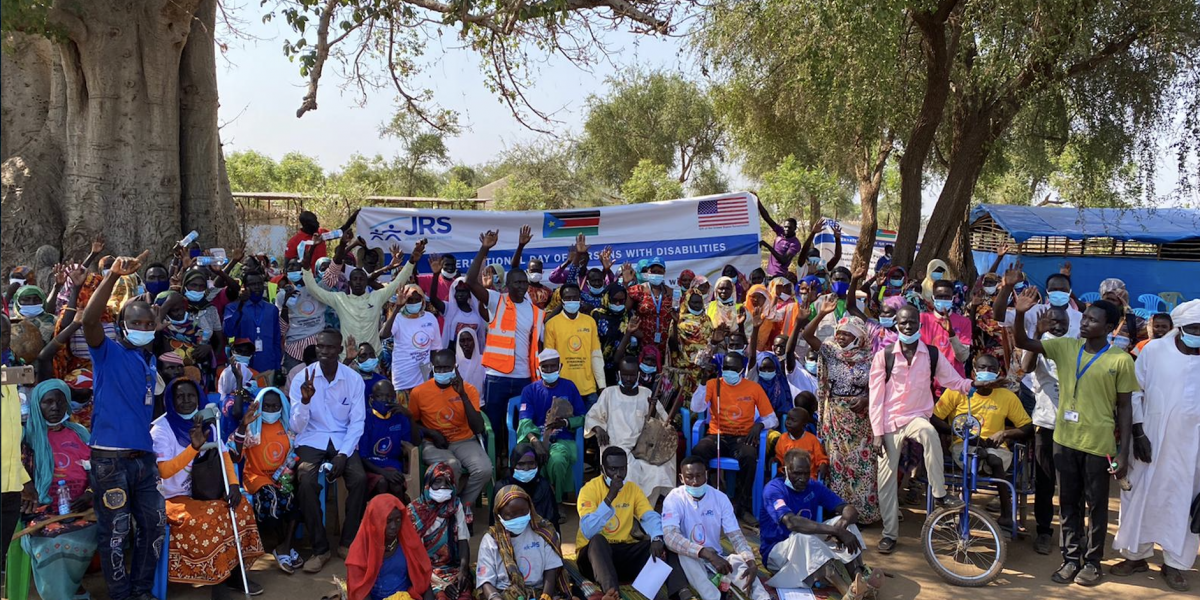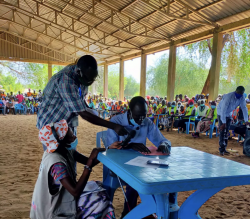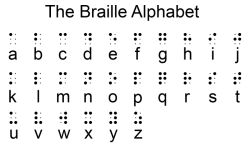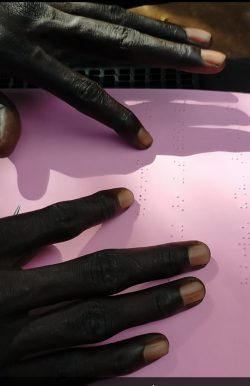Amplifying the voices of the visually impaired people
13 January 2022|By Kinaka Michael, SJ.

On the 4th of January, the world celebrates world Braille day. This day is set asset aside to celebrate not only our brothers and sisters who experience different forms of visual impairments but also the outstanding contribution that Braille has made to the world of the ‘blind’. This day comes a few days after the celebration of the International Day of People with disabilities (PWD). Both celebrations are built on the premise that any kind of disability is part of the human experience worthy to be celebrated. Is there any beauty in diversity?
The Maban county was not left behind in marking the auspicious occasion. Our refugee brothers and sisters living with disabilities were celebrated in their respective camps located within the county. The celebration brought together our PWDs, different refugee agencies, government officials, refugee communities, and the host communities where we all got a chance to appreciate life. There were different presentations such as poems, skits, and music performances all with a gentle message of advocacy and inclusion.

The Braille Magic, a Breakthrough to the Blind’s Literacy
Without the word, visible or tangible, there can be no education. Braille, the language of the visually impaired is a system of raised dots that enable the blind to read and write with their fingers. This system consists of six dots in which the vertical line consists of three dots and the horizontal of two. The combination of these dots in all kinds of positions produces characters to each of which we assign a particular meaning, just like the sighted people assign meaning to ink print. It is amazing how six dots can be so combined to represent so many things such as letters, marks of punctuation, signs, numerals, and musical notation. But again, look at what a language like English can do and/or say with an Alphabet of only 26 letters!

“There is no better time to be blind than today,” said Mr. Adut during his presentation on inclusion. Bwana Adut is a young refugee who is visually impaired and is currently doing his senior 3 in one of the community secondary schools in Maban. He counts himself blessed for having a chance to learn through braille.
Braille language was adopted as an official language for the blind only a century ago. It is clear to Mr. Adut that a century ago there was no literacy for the visually impaired owing to the lack of visible or tangible words. As such, he considers himself and the few other visually impaired persons in Maban who have gotten a chance to acquire formal education through braille as existing at a very privileged time. The enthusiasm noted in the young scholars is proof that braille has become a lamp to the stumbling feet along the paths of knowledge and intelligence.

The greatest challenge that Adut faces as a visually impaired student, is that none of his school teachers can transcribe the lesson content into braille. This means that he cannot receive notes or any form of written assignment from his teachers. Besides, there are no braille curriculum learning and teaching materials from the ministry of education that can help the visually impaired. As a result, Adut relies on the generosity of his sighted classmates and friends who would repeat the class content for him orally after which he translates such content into braille for his reference.
I occasionally meet Adut to learn from each other and practice braille skills. It is in these encounters that we appreciate the beauty of every human experience that enriches our diversity.
The good news is that Adut has risen above his ‘limitation’ (visual impairment) and he feels that his venture into education has given him a voice to even advocate for others.
He is the only one from his settlement camp who has been lucky to get formal education. Adut believes that it is not much about the physical limitation that blind people face but it is the societal/ educational structures and barriers that make it impossible for him to excel. All, in all, Adut is a great witness of hope and resilience. How can we clear/break all kinds of barriers for one another.
Shukran.


